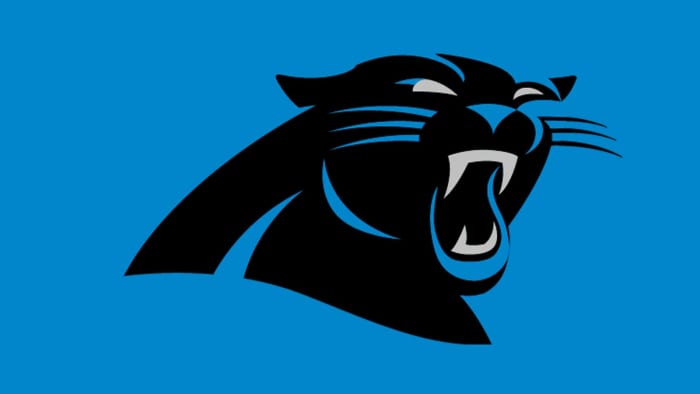Stick around the NFL draft long enough, and anything can happen.
The Panthers discovered that in 2003 when something so strange occurred that they ended up jumping up one spot in the first round to grab offensive tackle Jordan Gross from Utah with the eighth pick. Carolina was slated to pick ninth, but everything went a little sideways when the Minnesota Vikings went on the clock with the seventh pick.
To tell the story properly, three principal players who were involved in the bizarre incident need to give details from their unique perspectives.
Jackie Miles, the Panthers' equipment manager, was in New York where all teams officially turn in their picks to the NFL. As he had done every year since the team's first draft in 1995, Miles sat at a table in Madison Square Garden and communicated via a dedicated phone line with the Panthers' war room back in Charlotte, where general manager Marty Hurney and others were making the decisions. Once the war room determined the player to be chosen, they gave the information to Miles, who relayed it to the NFL by handing over a card with the player's name, position and school written on it.
Hurney was presiding over only his second draft since being named general manager. Among those in the war room with him were head coach John Fox, director of player personnel Jack Bushofsky and director of college scouting Tony Softli.
"It was different then than it is now. You were primarily there - me and (assistant equipment manager) Don Toner - to be the eyes and ears of the draft," Miles said.

Panthers assistant equipment manager Don Toner, equimpment manager Jackie Miles and video assistant Jeff Mueller at the 2013 NFL Draft.
Miles was an expert at figuring out what was going down on the draft floor filled with representatives from the other 31 clubs. He always kept one eye on Joel Bussert on the main stage. Bussert, the NFL's long-time senior vice president of player personnel and football operations, manned what Miles called "the trade phone," and whenever he was on it, Miles knew something was up.
There was another telltale sign for that. Whenever it was a team's turn to pick and they were on the clock, two representatives from the NFL would come and stand behind the table of the team picking. If Bussert was on the phone and one of the two NFL representatives suddenly left one table to go stand behind the table of another team, Miles knew those two teams were involved in some kind of deal, and he would immediately alert the war room back in Charlotte.
Gross was at his small townhome in Salt Lake City with his wife, Dana, one of his agents and a few other family members. He expected to be selected anywhere from third to 15th overall, but he did not think he was on the Panthers' radar.
"The Texans were picking third, and that was the highest I thought in a crazy-perfect scenario that I would have gone. And I thought the bottom was kind of around 15," Gross said. "My wife and I were already married. We had a duplex in Salt Lake City, so we were staying there. I actually got invited to New York - but they didn't invite that many guys back then, so if you were 12th or above you were the last guy and it became a sad story, you know? And I was already married, so it was going to be hard to figure out who could come and who couldn't, because you're only allowed to bring a certain amount of people. So we just decided to stay home."
The night before, Gross had gone out to dinner with his small entourage, and his mother had pulled their waitress aside.
"He's going to get drafted tomorrow," she told the waitress, pointing proudly to her son.
The waitress seemed puzzled and replied, "What? Into the military?"
The next day, as the first round of the NFL Draft unfolded rather quickly, Miles began counting down how much time the Vikings had left to make the seventh overall pick, relaying the information to the war room at Ericsson Stadium. What happened next is a little fuzzy.
As the clock ticked toward zero, Miles started panicking a little. He and the Panthers' brain trust had discussed what would happen if a team didn't make a selection in its allotted time. Teams drafting behind them would then be allowed to jump them until the team in question finally turned in its pick.
"What happened on this particular thing was, number one, it was the first round. Most of this happens in the seventh round, when there's five minutes to pick. This is the first round and a 15-minute clock," Miles said. "And I'm like, 'Hey, guys, they're down to 10 minutes…they're down to five…they're down to three.' Finally, it got down to 30 seconds on the clock, and we were looking at the (Minnesota) table and there was no action whatsoever.
"So I'm like, 'Guys, give me the pick. They're going to go off the clock.'
"And they're like, 'What are you talking about? Jacksonville's ahead of us.'
"And I'm like, 'Jacksonville's going to jump them. We can jump them, too.'
"I think at first it was disbelief and I don't think they really understood what I was telling them."
Hurney remembers it unfolding a little bit differently, or at least more calmly, from his war room perspective.
"We were always prepared," Hurney said. "We always knew, even when the team right before us took it right down to the end of the clock, who we were going to pick. And we always got our picks in quickly, especially our first round picks."
Miles, though, was getting more than a little nervous at the time in New York.
"Remember, this was 12 years ago. It's not like today where television is so heavily involved," Miles said. "The Jacksonville guy was a real good friend of mine, and they were sitting right next to us. And if you were going to jump someone, you had to run your pick up to Bussert or up to the table up front. I saw the Jacksonville guy stand up, and I said, 'Who are you guys taking?' And he said, 'Byron Leftwich.'
"So I told our people, and they were still in disbelief that Minnesota would go off the clock. And I think they didn't quite understand that even though we weren't the very next team up we could jump Minnesota, too. After going back and forth a couple of times, I started panicking. I said, 'Give me a pick! Give me a pick!'

"Finally, Tony Softli came out of nowhere and said, 'Write down Jordan Gross, offensive tackle, Utah.' So then I ran it up. As soon as I turned in our pick, Minnesota finally came up right behind me and turned in their pick, which turned out to be (defensive end) Kevin Williams. We were all in disbelief. Everybody was trying to process it. They already knew who we were going to pick, but nobody was telling me at first."
Hurney's version, again, is a bit calmer.
"As the clock ticked down on Minnesota, we talked to Jackie up in New York and we said, 'Get the card ready. And if they don't get the pick in on time, go!' Because we knew who they were going to take and who we wanted," Hurney said. "So when the clock expired, he already had Jordan Gross' name on the card and he ran up there and we got it in."
Told that Miles' version of the story was a little more, uh, frantic, Hurney let out a hearty laugh.
"Of course Jackie got nervous. Jackie's like me. We're two nervous people," he said.
Meanwhile, back in Salt Lake City, Gross was a bit confused. He was watching the draft unfold on ESPN and he noticed the clock running out on Minnesota.
"I remember Chris Berman was the host and he was like, 'They better get this pick in quick.' And they're showing the Vikings' table, and their version of Jackie Miles isn't moving. He's just sitting there. And no one really knew what would happen next, because it had never really happened before," Gross said.
"Then all of a sudden they said Jacksonville was on the clock, and then their pick was in immediately. What we found out was that anyone could go in sequential order, but that the Vikings could jump back in at any time. So Jacksonville flew their pick up. And on TV, they're like, 'Quarterback Byron Leftwich to Jacksonville as the seventh pick instead of the eighth,' and they start showing his highlights.
"Right then our phone rings, and it's Foxy. He's like, 'Hey, you ready to be a Carolina Panther?' By that time, they're already announcing me on TV and it's chaos in our house. It all happened within like four minutes, from when the clock ran out on the Vikings to when I got taken two picks later.
"So I was on the phone. I'm getting picked, my mom is cheering, I'm trying to figure out who I'm even talking to. It was just crazy. Then Kevin Williams got picked by the Vikings with what was then the ninth pick. And I'll never forget, they didn't run my highlights then - because normally you get picked and there are 15 minutes for them to talk about how great a football player you are before the next pick. And they never did that until way later in the first round when they finally had a chance to catch up. My mom was upset because they didn't give me my 15 minutes of fame or whatever."
One aspect of the story all three parties involved completely agree on is the reason for Fox's quick phone call to Gross.
"When you pick a player, the war room always wants to get him on the phone first," Miles said. "They want to make sure the guy is alive, because supposedly a team in the Canadian Football League years ago drafted a guy who had died a month before. So now, teams always make sure they can get the guy on the phone. And if they can't, there's usually a panic and sometimes they even pick someone else."
Both Gross and Hurney confirmed that story. All that was left after that was for Hurney to negotiate a contract with the Panthers' new draft choice.
"So I go to Carolina and instead of being the ninth pick, I was the eighth pick for the Panthers," Gross said. "And that was an argument, but not for long, with Marty. He was like, 'You were the ninth pick.' And we were like, 'No, we were the eighth pick.'"
That was a difference of quite a bit of money in Gross' first contract, although Hurney also laughs about it now - and about his initial feeble attempt to argue that Gross should be paid as the ninth overall selection.
"Yeah, we did have to pay him as the eighth pick. Jordan and I have joked about that over the years. Eighth pick, ninth pick…whatever it was, we got a heck of a deal, didn't we?" Hurney said. "He was an excellent player, he was a leader. He's a great person, and he really epitomizes what the Carolina Panthers' organization is."
He also arrived with a draft story that no Panther before or since has been able to match.






